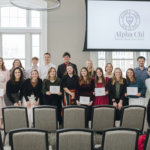Jonathan Magee of Cincinnati, Ohio, began his career in church marketing. While he found the tasks enjoyable, he wasn’t fulfilled by the work he was doing on a day-to-day basis.
He knew he wanted to help people, have one-on-one discussions, and make a tangible difference in someone’s life.
These realizations brought clarity to Magee’s search process. He knew counseling was precisely what he was looking for, and a Masters in Clinical Mental Health Counseling program was his next step.
Beginning a Counseling Masters Degree
Magee enrolled in the counseling program at St. Bonaventure University, believing a secular education would provide a universal base of knowledge and allow him to have a broader reach in his practice. But shortly after beginning his courses, Magee was disappointed in the experience.
“I found it very limiting,” said Magee. “In fact, it was not the open dialogue that I had hoped for in a secular university. The teaching was very narrow-minded.”
Topics around race, gender, and sexuality were seen without nuance, adopting a secular humanistic view. Magee realized he wanted his schooling to come from a Christian perspective. Secular schools were missing a key element of counseling: spirituality.
“I initially thought I wanted a somewhat secular viewpoint, but I realized once you remove God, He is quickly replaced by something else,” said Magee.
This spurred Magee to begin looking online for a Christian counseling masters degree that integrated clinically proven counseling strategies with the Christian faith. As a result, he found Grace’s masters in clinical mental health counseling program.
While his education prepared him to be a quality clinician, he also witnessed his faith grow throughout the program. “The program is unifying because there are always disagreements in the world and in the field itself,” said Magee. “But the Grace students and faculty are all unified through the faith element of this program.”
He found that the clinical mental health counseling program at Grace addresses challenging topics and prepares students to serve people from diverse faith backgrounds.





